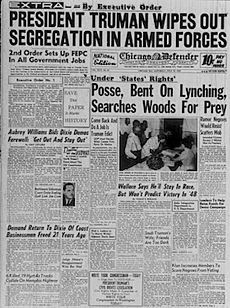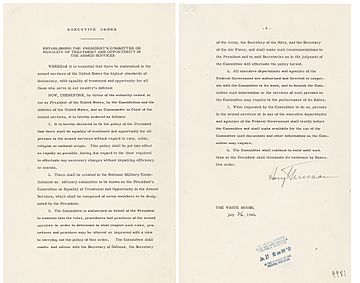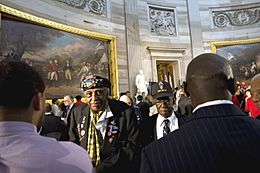Executive Order 9981 facts for kids
Executive Order 9981 was a special rule made by President Harry S. Truman on July 26, 1948. This rule, called an executive order, made it illegal to treat people unfairly in the U.S. Armed Forces. It stopped discrimination based on a person's race, skin color, religion, or where they came from.
This order was very important for the civil rights movement after World War II. It helped bring different groups of people together in the military. This process, called re-integration, happened during the Korean War (1950–1953).
Life Before Executive Order 9981

Before Executive Order 9981, Black Americans in the military faced many unfair rules. They often had to wait much longer than white soldiers to start combat training. For example, they might wait four years, while white soldiers could start in a few months.
The Air Corps also slowed down the training of African Americans. This happened even when they needed more people to join. The Women's Army Corps (WAC) allowed Black women to join. However, they were not allowed to serve overseas.
During World War II, Black soldiers in Britain saw unfair treatment. The U.S. military tried to make them follow Jim Crow rules. These rules forced people of different races to stay separate. Britain itself did not have these racist practices.
Some pub owners in Bamber Bridge, Britain, were told to separate their customers. The U.S. military wanted them to have different areas for Black soldiers. Instead, the pub owners put up signs that said "Black Troops Only." This showed they did not agree with the segregation.
In 1945, a study was done with white officers and sergeants. They had Black platoons assigned to their companies. The results were very positive. About 77% said their feelings towards Black soldiers improved. No one said their feelings got worse.
Most officers (84%) and sergeants (81%) thought Black soldiers fought very well. Only a small number (5% of officers, 4% of sergeants) thought Black infantry soldiers were not as good. A large majority (73% of officers, 60% of sergeants) felt Black and white soldiers got along well. This study showed there was no good reason for keeping the armed forces separate.
Efforts to End Discrimination
In 1947, a civil rights leader named A. Philip Randolph worked to end unfair treatment in the military. He teamed up with Grant Reynolds. They started a group called the Committee Against Jim Crow in Military Service and Training. Later, it was renamed the League for Non-Violent Civil Disobedience Against Military Segregation.
President Truman's order built on an earlier rule, Executive Order 8802. It aimed to make sure everyone in the military had equal treatment and chances. This meant no one should be treated differently because of their race, religion, or where they came from.
The order stated that it was the President's goal to have "equality of treatment and opportunity for all persons in the armed services." This policy was to be put into action as quickly as possible. It also created a committee. This group would look into how to make these changes happen smoothly.
The order also ended the separate training camp for Black Marines at Montford Point. It became part of Marine Corps Base Camp Lejeune.
Most of the changes from this order happened under President Dwight D. Eisenhower. He was president from 1953 to 1961. During his time, military schools, hospitals, and bases became desegregated. The last military units made up only of Black soldiers were ended in September 1954.
Kenneth Claiborne Royall was the Secretary of the Army. He was forced to leave his job in April 1949. This was because he kept refusing to desegregate the army. This happened almost a year after President Truman's order.
Fifteen years after Truman's order, on July 26, 1963, Secretary of Defense Robert McNamara issued Directive 5120.36. This directive encouraged military leaders to use their money to stop supporting places that discriminated. This included facilities used by soldiers or their families that treated people unfairly based on sex or race.
 | Audre Lorde |
 | John Berry Meachum |
 | Ferdinand Lee Barnett |




